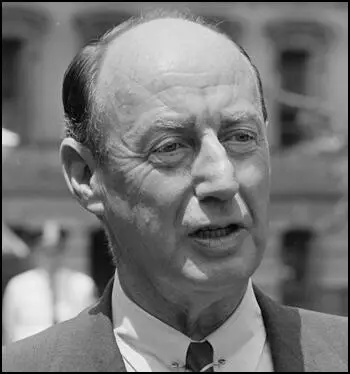On this day on 14th July
On this day in 1791 riots in Birmingham against Joseph Priestley. Hostility towards Joseph Priestley increased in when he wrote a pamphlet defending the French Revolution. Priestley argued that he believed the events in France increased the chance of "universal peace and goodwill among all nations" as it made possible an "empire of reason". His predictions that the French Revolution heralded a change in the role of the monarchy upset King George III. The king and his supporters particularly disliked Priestley's view that in future monarchs will be the "first servants of the people and accountable to them". Priestley now obtained the nickname 'Gunpowder' after he expressed the view that it should be placed "under the old building of error and superstition".
In 1791 Priestley published A Political Dialogue on the General Principles of Government. In the book Priestley expressed similar political ideas to those expressed by Tom Paine in the Rights of Man. Later that year Priestley took part in forming a Constitutional Society in Birmingham. Tories in the city made inflammatory speeches attacking Priestley's political ideas and this resulted in a mob breaking into his house and destroying most of his papers, books and scientific equipment.
After the Birmingham riots Priestley moved to London where he taught history and science at New College, Hackney. Priestley experienced a great deal of hostility in London for his political and religious beliefs and in 1774 he decided to emigrate to America. He settled in Pennsylvania and over the next few years he wrote several books on Unitarianism. Priestley also established the first Unitarian Church in America.
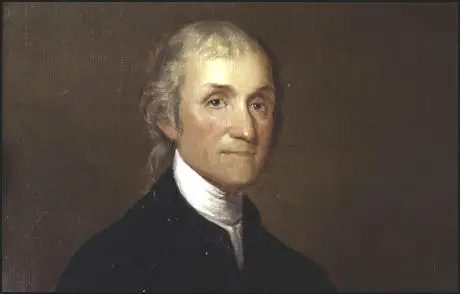
On this day in 1861 Major Sullivan Ballou writes last letter to his wife.
The indications are very strong that we shall move in a few days - perhaps tomorrow. Lest I should not be able to write you again, I feel impelled to write lines that may fall under your eye when I shall be no more.
Our movement may be one of a few days duration and full of pleasure - and it may be one of severe conflict and death to me. Not my will, but thine O God, be done. If it is necessary that I should fall on the battlefield for my country, I am ready. I have no misgivings about, or lack of confidence in, the cause in which I am engaged, and my courage does not halt or falter. I know how strongly American Civilization now leans upon the triumph of the Government, and how great a debt we owe to those who went before us through the blood and suffering of the Revolution. And I am willing - perfectly willing - to lay down all my joys in this life, to help maintain this Government, and to pay that debt.
But, my dear wife, when I know that with my own joys I lay down nearly all of yours, and replace them in this life with cares and sorrows - when, after having eaten for long years the bitter fruit of orphanage myself, I must offer it as their only sustenance to my dear little children - is it weak or dishonorable, while the banner of my purpose floats calmly and proudly in the breeze, that my unbounded love for you, my darling wife and children, should struggle in fierce, though useless, contest with my love of country?
I cannot describe to you my feelings on this calm summer night, when two thousand men are sleeping around me, many of them enjoying the last, perhaps, before that of death - and I, suspicious that Death is creeping behind me with his fatal dart, am communing with God, my country, and thee.
I have sought most closely and diligently, and often in my breast, for a wrong motive in thus hazarding the happiness of those I loved and I could not find one. A pure love of my country and of the principles have often advocated before the people and "the name of honor that I love more than I fear death" have called upon me, and I have obeyed.
Sarah, my love for you is deathless, it seems to bind me to you with mighty cables that nothing but Omnipotence could break; and yet my love of Country comes over me like a strong wind and bears me irresistibly on with all these chains to the battlefield.
The memories of the blissful moments I have spent with you come creeping over me, and I feel most gratified to God and to you that I have enjoyed them so long. And hard it is for me to give them up and burn to ashes the hopes of future years, when God willing, we might still have lived and loved together and seen our sons grow up to honorable manhood around us. I have, I know, but few and small claims upon Divine Providence, but something whispers to me - perhaps it is the wafted prayer of my little Edgar - that I shall return to my loved ones unharmed. If I do not, my dear Sarah, never forget how much I love you, and when my last breath escapes me on the battlefield, it will whisper your name.
Forgive my many faults, and the many pains I have caused you. How thoughtless and foolish I have oftentimes been! How gladly would I wash out with my tears every little spot upon your happiness, and struggle with all the misfortune of this world, to shield you and my children from harm. But I cannot. I must watch you from the spirit land and hover near you, while you buffet the storms with your precious little freight, and wait with sad patience till we meet to part no more.
But, O Sarah! If the dead can come back to this earth and flit unseen around those they loved, I shall always be near you; in the garish day and in the darkest night - amidst your happiest scenes and gloomiest hours - always, always; and if there be a soft breeze upon your cheek, it shall be my breath; or the cool air fans your throbbing temple, it shall be my spirit passing by.
Sarah, do not mourn me dead; think I am gone and wait for thee, for we shall meet again.
As for my little boys, they will grow as I have done, and never know a father's love and care. Little Willie is too young to remember me long, and my blue-eyed Edgar will keep my frolics with him among the dimmest memories of his childhood. Sarah, I have unlimited confidence in your maternal care and your development of their characters. Tell my two mothers his and hers I call God's blessing upon them. O Sarah, I wait for you there! Come to me, and lead thither my children.
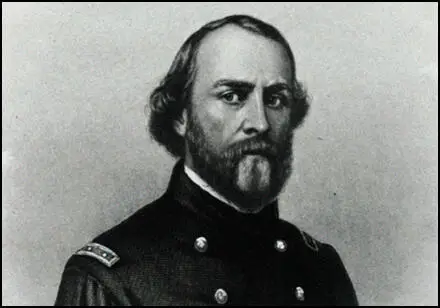
On this day in 1881 Billy the Kid dies. Henry McCarty (Billy the Kid) was born in New York City on 17th September, 1859. After the death of his father, Patrick McCarty in 1863, the family moved to Wichita. His mother remarried William Antrim but she died in 1874. Around this time he acquired the nickname, Billy the Kid.
In 1875 Billy was arrested and charged with being involved in robbing a Chinese laundry. He managed to escape through a fireplace chimney and fled to Arizona where he became involved in horse stealing. In August 1877 he killed Frank Cahill, an army blacksmith at Fort Grant. He was arrested but once again escaped and eventually found work with John Tunstall.
After Tunstall was murdered on 18th February, 1878. This incident started the Lincoln County War. Billy the Kid was deeply affected by this murder and claimed that Tunstall "was the only man that ever treated me like I was a free-born and white." Apparently at Tunstall's funeral Billy the Kid swore: "I'll get every son-of-a-bitch who helped kill John if it's the last thing I do."
Billy the Kid joined the Regulators, a group led by Dick Brewer that supported Alexander McSween, Tunstall's former partner. It was claimed that Tunstall had been murdered on the orders of Major L. G. Murphy. Over the next few months this group killed Sheriff William Brady, George Hindman, Frank Baker, William Morton, Buckshot Roberts and others who they claimed they had been involved in the killing of Tunstall.
On 19th July, 1878, Alexander McSween and his supporters, including Billy the Kid, were besieged by Sheriff George Peppin and a group of his men. McSween's house was set on fire and several people were shot dead as they came out of the house. This included McSween but Billy the Kid managed to escape.
When Lewis Wallace took office as Governor of New Mexico on 1st October 1878, he proclaimed an amnesty for all those involved in the bitter feud. However, after Billy the Kid surrendered to the authorities, he was told he would be charged with the killing of William Brady. Billy the Kid escaped from custody and went to see John Chisum, a prominent figure in the Lincoln County War. Billy believed he was owed $500 but Chisum refused to pay. Billy the Kid responded by promising to steal enough cattle to make up this sum. This he did with a gang that included Dave Rudabaugh, Billy Wilson, Tom O'Folliard and Charles Bowdre. Billy's gang also stole from other cattlemen and became a serious problem in Lincoln County.
In 1880 Pat Garrett was elected sheriff of Lincoln County. He immediately attempted to deal with the problems being caused by Billy the Kid. In December 1880, Garrett shot dead two of the Kid's gang, Tom O'Folliard and Charles Bowdre. Soon afterwards Billy the Kid, Dave Rudabaugh and Billy Wilson were captured by Garratt.
Billy the Kid was found guilty of murdering William Brady and was held in Lincoln jail while waiting to be executed on 13th May, 1881. However, Billy killed two guards (J.W. Bell and Bob Olinger) and escaped while Pat Garrett was away collecting taxes. News eventually reached Garratt that Billy the Kid was hiding out at the abandoned Fort Sumner. With his deputies, John Poe and Thomas McKinney, Garratt headed for Fort Sumner, a place 140 miles west of Lincoln. On 14th July, 1881, Garratt killed Billy the Kid during a shoot-out in a darkened room at the home of Pete Maxwell.
It was later claimed that Billy the Kid had killed 21 men in his 21 years of life. However, most experts believe he was only responsible for nine deaths.
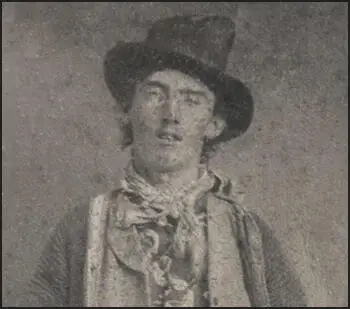
On this day in 1913 Gerald Ford, 38th President of the United States is born. Leslie King was born in Omaha, Nebraska, on 14th July, 1913. His parents divorced when he was an infant and his mother remarried a paint salesman in Michigan. Leslie's name was changed to that of his stepfather, Gerald Rudolph Ford.
An outstanding sportsman he won a football scholarship to the University of Michigan, before studying law at Yale University. Ford graduated in 1941 and after being admitted to the bar began work in Grand Rapids, Michigan.
During the Second World War Ford served in the United States Navy and saw action in Okinawa, Wake Island, Taiwan, the Philippines and the Gilbert Islands. By the time he was discharged in 1946 had reached the rank as lieutenant commander.
A member of the Republican Party, Ford was elected to the House of Representatives in 1946. He was re-elected to the next eleven Congresses. He soon developed a reputation as a right-wing politician. As Harold Jackson pointed out: "He built up an impressive record of flat-earth conservatism. He voted against federal aid for education and housing, repeatedly resisted increases in the minimum wage, tried to block the introduction of medical care for the elderly, and consistently fought any measures to combat pollution. At the same time he supported virtually all increases in defence spending."
On the death of John F. Kennedy in 1963 his deputy, Lyndon B. Johnson, was appointed president. He immediately set up a commission to "ascertain, evaluate and report upon the facts relating to the assassination of the late President John F. Kennedy." Gerald Ford was invited to join the commission under the chairmanship of Earl Warren. Other members of the commission included Richard B. Russell, Thomas Hale Boggs, Allen W. Dulles, John J. McCloy and John S. Cooper.
One possible reason Johnson selected Ford was that he was under the control of J. Edgar Hoover. According to Bobby Baker (Wheeling and Dealing), who was himself under investigation for his corrupt relationship with politicians, businessmen and call-girls, Ford had been secretly taped by the FBI when he had attended meetings with Fred Black at the Sheraton-Carlton Hotel in Washington.
J. Lee Rankin became chief counsel for the Warren Commission. He then appointed Norman Redlich as his special assistant. Redlich began investigating the relationship between Lee Harvey Oswald and Jack Ruby. He was especially interested in why Oswald appeared to be heading towards Ruby's apartment after the assassination.
According to William C. Sullivan (The Bureau: My Thirty Years in Hoover's FBI) Gerald Ford provided J. Edgar Hoover with information about the activities of staff members of the commission. "Hoover was delighted when Gerald Ford was named to the Warren Commission. The director wrote in one of his internal memos that the bureau could expect Ford to 'look after FBI interests,' and he did, keeping us fully advised of what was going on behind closed doors. He was our man, our informant, on the Warren Commission."
Hoover ordered that the FBI should carry out an investigation of Norman Redlich. He discovered that Redlich was on the Emergency Civil Liberties Committee, an organization considered by Hoover to have been set-up to "defend the cases of Communist lawbreakers". Redlich had also been critical of the activities of the House Committee on Un-American Activities.
This information was leaked to a group of right-wing politicians. On 5th May, 1964, Ralph F. Beermann, a Republican Party congressman, made a speech claiming that Redlich was associated with the Fair Play for Cuba Committee. Beermann called for Redlich to be removed as a staff member of the Warren Commission. He was supported by Karl E. Mundt who said: "We want a report from the Commission which Americans will accept as factual, which will put to rest all the ugly rumors now in circulation and which the world will believe. Who but the most gullible would believe any report if it were written in part by persons with Communist connections?"
Gerald Ford joined in the attack and at one closed-door session of the Warren Commission he called for Norman Redlich to be dismissed. However, Rankin and Earl Warren both supported him and he retained his job. However, after this, Redlich posed no threat to the theory that Oswald was the lone gunman.
The original first draft of the Warren Commission Report stated that a bullet had entered Kennedy's "back at a point slightly above the shoulder and to the right of the spine." Ford realized that this provided a serious problem for the single bullet theory. As Michael L. Kurtz has pointed out (The JFK Assassination Debates): "If a bullet fired from the sixth-floor window of the Depository building nearly sixty feet higher than the limousine entered the president's back, with the president sitting in an upright position, it could hardly have exited from his throat at a point just above the Adam's apple, then abruptly change course and drive downward into Governor Connally's back."
In 1997 the Assassination Records Review Board (ARRB) released a document that revealed that Ford had altered the first draft of the report to read: "A bullet had entered the base of the back of his neck slightly to the right of the spine." Ford had elevated the location of the wound from its true location in the back to the neck to support the single bullet theory.
The Republican Party surprisingly nominated the extreme conservative, Barry Goldwater, in the 1964 presidential election. During the election campaign Goldwater called for an escalation of the war against North Vietnam. In comparison to Goldwater, Lyndon B. Johnson was seen as the 'peace' candidate. People feared that Goldwater would send troops to fight in Vietnam. Johnson, on the other hand, argued that he was not willing: "to send American boys nine or ten thousand miles away from home to do what Asian boys ought to be doing for themselves."
In the 1964 presidential election. Lyndon B. Johnson, who had been a popular leader during his year in office, easily defeated Barry Goldwater by 42,328,350 votes to 26,640,178. Johnson gained 61 per cent of the popular vote, giving him the largest majority ever achieved by an American president.
Another consequence of the election was that the House of Representatives had the largest Democratic majority since 1936. Gerald Ford was elected as minority leader by the slim margin of 73 to 67. During the Tet Offensive Ford called on Johnson to "Americanise the war". At that time, the US already had 500,000 troops fighting in the country. Johnson later described Ford as "so dumb he can't fart and chew gum at the same time."
By 1968, the popularity of the Democratic Party was in decline. Lyndon B. Johnson decided not to stand and was replaced by Hubert Humphrey as the party's presidential candidate. With progressive forces in the country unhappy with Humphrey's support of the Vietnam War, and with George Wallace collecting over 9 million votes in the South, it was no surprise when Richard Nixon won the election. Nixon received 31,770,237 votes against 31,270,533 for Humphrey.
Ford worked closely with Nixon's new administration. Alexander Butterfield later claimed that Nixon always had the minority leader totally under his thumb. He added: "He was a tool of the Nixon administration, like a puppy dog. They used him when they had to - wind him up and he'd go."
In 1970 two of Nixon's conservative nominees to the Supreme Court (Clement Haynsworth and G. Harrold Carswell) failed their Senate confirmation hearings. Ford joined forces with Richard Nixon and Attorney General John N. Mitchell in an effort to get liberal justice, William O. Douglas, to resign. Stories were spread that Douglas was in the pay of the Parvin Foundation. In April 1970 Ford moved to impeach Douglas, the first major modern era attempt to impeach a member of the Supreme Court. Ford gained very little support for his actions and the hearings were brought to a close and no public vote on the matter was taken.
In 1973, Nixon's vice-president, Spiro Agnew was investigated for extortion, bribery and income-tax violations while governor of Maryland. On 10th October, 1973 resigned as vice-president. Nixon attempted to appoint John Connally as Agnew's replacement. However, Nixon was warned that his appointment would not be confirmed by Congress. Nixon therefore selected Ford instead.
Gerald Ford became president when Richard Nixon was also forced to resign over the Watergate Scandal in August, 1974. Ford therefore became the first man in history to become the president of the United States without having been elected as either president or vice president. Ford nominated Nelson Rockefeller as his vice president. During his confirmation hearings it was revealed that over the years he had made large gifts of money to government officials such as Henry Kissinger.
On 8th September, 1974, Ford controversially granted Richard Nixon a full pardon "for all offences against the United States" that might have been committed while in office. The pardon brought an end all criminal prosecutions that Nixon might have had to face concerning the Watergate Scandal.
On October 17, 1974, Ford vetoed the bill that would significantly strengthen the Freedom Of Information Act, calling it “unconstitutional and unworkable.” However, in November the House of Representatives and the Senate overrode President Ford’s veto.
In December, 1974, Seymour Hersh of the New York Times, published a series of articles claiming that the Central Intelligence Agency had been guilty of illegal activities. In his memoirs, Ford said that he feared a congressional investigation would result in "unnecessary disclosures" that could "cripple" the CIA. He and his aides quickly decided that he needed to prevent an independent congressional investigation. He therefore appointed Nelson Rockefeller to head his own investigation into these allegations.
Other members of the Rockefeller Commission included C. Douglas Dillon, Ronald Reagan, John T. Connor, Edgar F. Shannon, Lyman L. Lemmitzer, and Erwin N. Griswold. Executive Director of the task-force was David W. Belin, the former counsel to the Warren Commission and leading supporter of the magic bullet theory. In 1973 Berlin had published his book, November 22, 1963: You are the Jury, in which he defended the Warren Report as an historic, "unshakeable" document.
In her book, Challenging the Secret Government: The Post-Watergate Investigations of the CIA and FBI, Kathryn S. Olmsted, wrote: "His choice for chairman, Vice President Nelson Rockefeller, had served as a member of the President's Foreign Intelligence Advisory Board, which monitored the CIA. Members Erwin Griswold, Lane Kirkland, Douglas Dillon, and Ronald Reagan had all been privy to CIA secrets in the past or noted for their strong support of governmental secrecy."
The journalist, Joseph Kraft, argued that he feared that the Rockefeller report would not end "the terrible doubts which continue to eat away at the nation." This was reflected in public opinion polls taken at the time. Only 33% had confidence in the Rockefeller Commission and 43% believed that the commission would turn into "another cover-up".
At a meeting with some senior figures at the New York Times, including Arthur O. Sulzberger and A. M. Rosenthal, President Gerald Ford let slip the information that the CIA had been involved in conspiracies to assassinate political leaders. He immediately told them that this information was off the record. This story was leaked to the journalist Daniel Schorr who reported the story on CBS News. As Schorr argued in his autobiography, Staying Tuned: " President Ford moved swiftly to head off a searching congressional investigation by extending the term of the Rockefeller commission and adding the assassination issue to its agenda."
Rockefeller's report was published in 1975. It included information on some CIA abuses. As David Corn pointed out in Blond Ghost: "the President's panel revealed that the CIA had tested LSD on unsuspecting subjects, spied on American dissidents, physically abused a defector, burgled and bugged without court orders, intercepted mail illegally, and engaged in plainly unlawful conduct". The report also produced details about MKULTRA, a CIA mind control project.
Rockefeller also included an 18-page section on the assassination of John F. Kennedy (Allegations Concerning the Assassination of John F. Kennedy). A large part of the report was taken up with examining the cases of E. Howard Hunt and Frank Sturgis. This was as a result of both men being involved in the Watergate Scandal. The report argued that a search of agency records showed that Sturgis had never been a CIA agent, informant or operative. The commission also accepted the word of both men that they were not in Dallas on the day of the assassination.
The Rockefeller Commission also looked at the possibility that John F. Kennedy had been fired at by more than one gunman. After a brief summary of the Warren Commission (1964) and the Ramsay Clark Panel (1968) investigations, Rockefeller concluded: "On the basis of the investigation conducted by its staff, the Commission believes that there is no evidence to support the claim that President Kennedy was struck by a bullet fired from either the grassy knoll or any other position to his front, right front or right side, and that the motions of the President's head and body, following the shot that struck him in the head, are fully consistent with that shot having come from a point to his rear, above him and slightly to his right."
Nelson Rockefeller also looked at the possible connections between E. Howard Hunt, Lee Harvey Oswald, Jack Ruby and the CIA. He claimed that there was no "credible evidence" that Oswald or Ruby were CIA agents or informants. Nor did Hunt ever have contact with Oswald. The report argues: "Hunt's employment record with the CIA indicated that he had no duties involving contacts with Cuban exile elements or organizations inside or outside the United States after the early months of 1961... Hunt and Sturgis categorically denied that they had ever met or known Oswald or Ruby. They further denied that they ever had any connections whatever with either Oswald or Ruby."
This section of the report reached the following conclusions: "Numerous allegations have been made that the CIA participated in the assassination of President John F. Kennedy. The Commission staff investigated these allegations. On the basis of the staff's investigation, the Commission concluded there was no credible evidence of any CIA involvement."
The report was condemned as a cover-up. Dr. Cyril H. Wecht accused the Rockefeller Commission of "deliberately distorting and suppressing" part of his testimony as to the nature of Kennedy's head and neck wounds. Wecht demanded that a full transcript of his testimony be released. Rockefeller refused on the grounds that the commission proceedings were confidential.
Dissatisfaction with the report resulted in other investigations into the CIA taking place. This included those led by Frank Church, Richard Schweiker, Louis Stokes, Lucien Nedzi and Otis Pike.
Ford's ability to govern was handicapped by the way he had obtained power and the fact that he had to deal with a Congress controlled by the Democratic Party. On over fifty occasions Congress vetoed his proposed legislation. Ford also struggled with rampant inflation and the highest unemployment rate since the Great Depression.
At the Republican National Convention in August, 1976, Ford defeated Ronald Reagan and won the party's nomination. His presidential campaign did not go well. In one of his televised debates with Jimmy Carter he stated "there is no Soviet domination of Eastern Europe". Ford, was also handicapped by his association with Richard Nixon and the Watergate Scandal, and was defeated by Carter by 40,276,040 to votes to 38,532,360.
After his defeat in 1976 Gerald Ford retired to his home in Palm Springs, California. In 1980, Ronald Reagan gave serious consideration to Ford as a potential vice-presidential running mate. Negotiations between the Reagan and Ford camps took place at the Republican National Convention in Detroit. According to an article by Richard V. Allen (New York Times Magazine, July 30, 2000). Ford conditioned his acceptance on Reagan's agreement to an unprecedented "co-presidency", giving Ford the power to control key executive branch appointments (such as Henry Kissinger as Secretary of State and Alan Greenspan as Treasury Secretary). After rejecting these terms, Reagan offered the vice-presidential nomination to George H. W. Bush.
In January 2006, Ford was treated for pneumonia. In August of that year it was reported that he had been fitted with a pacemaker. Gerald Ford died on 26th December, 2006.
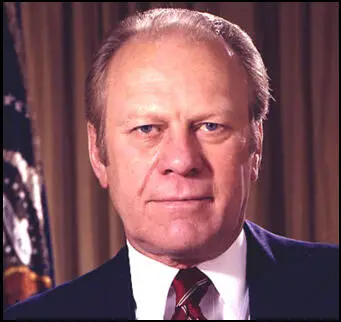
On this day in 1918 Felix Dzerzhinsky, head of the All-Russian Extraordinary Commission for Combating Counter-Revolution and Sabotage (Cheka), is interviewed in Novaya Zhizn and talks about the proposed Red Terror: "We stand for organized terror - this should be frankly admitted. Terror is an absolute necessity during times of revolution. Our aim is to fight against the enemies of the Soviet Government and of the new order of life. We judge quickly. In most cases only a day passes between the apprehension of the criminal and his sentence. When confronted with evidence criminals in almost every case confess; and what argument can have greater weight than a criminal's own confession."
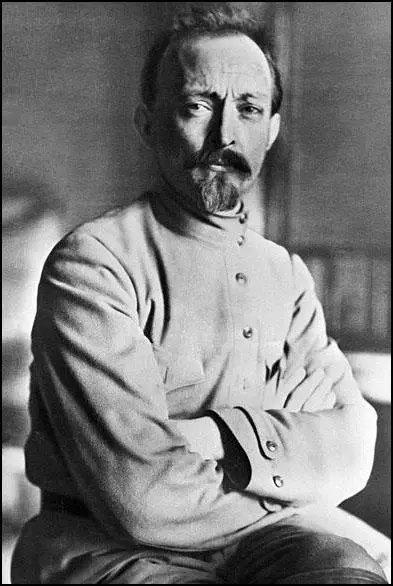
On this day in 1919 Ernst Toller makes speech while being tried for high treason.
We revolutionaries acknowledge the right to revolution when we see that the situation is no longer tolerable, that it has become a frozen. Then we have the right to overthrow it.
The working class will not halt until socialism has been realized. The revolution is like a vessel filled with the pulsating heartbeat of millions of working people. And the spirit of revolution will not die while the hearts of these workers continue to beat.
Gentlemen! I am convinced that, by your own lights, you will pronounce judgement to the best of your knowledge and belief. But knowing my views you must also accept that I shall regard your verdict as the expression, not of justice, but of power.
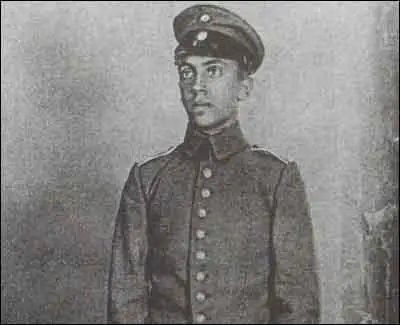
On this day in 1920 Leon Trotsky makes speech to the Second Congress of the Communist Youth International in an attempt to justify action at Kronstadt Uprising. "Two or three days more and the Baltic Sea would have been ice-free and the war vessels of the foreign imperialists could have entered the ports of Kronstadt and Petrograd. Had we then been compelled to surrender Petrograd, it would have opened the road to Moscow, for there are virtually no defensive points between Petrograd and Moscow."
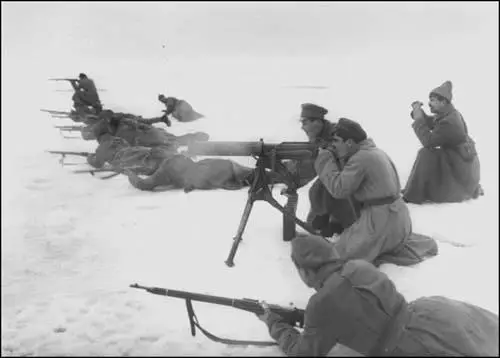
On this day in 1944 Claus von Stauffenberg makes decision to kill Adolf Hitler as part of the July Plot. He was quoted as saying: "The worst thing is knowing that we cannot succeed and yet that we have to do it, for our country and our children."
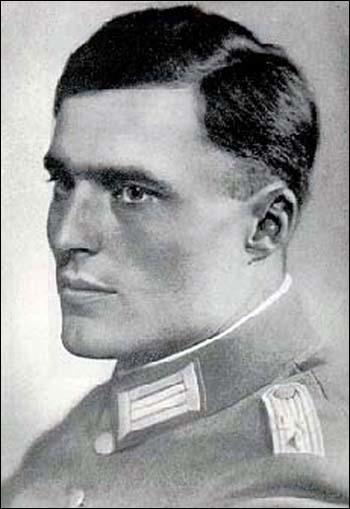
On this day in 1965 politician Adlai Stevenson dies in London.
Adlai Ewing Stevenson, the grandson of the former vice president, Adlai E. Stevenson (1893-97), was born in Los Angeles on 5th February, 1900. After studying at Princeton University, Stevenson worked as a journalist and as a lawyer in Chicago.
In July 1941 William Knox persuaded Stevenson to join the Navy Department. During the Second World War Stevenson took part in several European missions for the State Department and from 1945 served on the American delegations to the foundation conferences of the United Nations Organization.
In 1948 Stevenson was elected governor of Illinois, where he developed a reputation for honesty and efficiency. He introduced a series of reforms including a merit system for the state police, improvements in state mental hospitals and greater state aid for schools.
While governor of Illinois Stevenson became a target for Joe McCarthy. Stevenson was attacked for appearing as a character witness for Alger Hiss, the alleged communist spy, in his perjury trial. Stevenson also upset a group of Conservative senators, including Pat McCarran, John Wood, Karl Mundt and Richard Nixon, when they sponsored a measure to deal with members of the Communist Party. Stevenson argued that "The whole notion of loyalty inquisitions is a national characteristic of the police state, not of democracy. The history of Soviet Russia is a modern example of this ancient practice. I must, in good conscience, protest against any unnecessary suppression of our rights as free men. We must not burn down the house to kill the rats." Despite the opposition of liberals such as Stevenson and Harry S. Truman, the Internal Security Act became law in 1950.
Stevenson was chosen as the Democratic Party candidate for the 1952 presidential election. It was one of the dirtiest in history with Richard Nixon, the Republican vice-presidential candidate, leading the attack on Stevenson. Speaking in Indiana, Nixon described Stevenson as a man with a "PhD from Dean Acheson's cowardly college of Communist containment." In an attempt to link Stevenson with the Soviet spy ring he added: "Somebody had to testify for Alger Hiss, but you don't have to elect him President of the United States."
Joseph McCarthy also attacked Stevenson as being soft on communism and claimed that he would like to spend sometime with him so that "I might be able to make a good American out of him." Stevenson retaliated by pointing out the dangers of "phony patriots", "ill-informed censors" and "self-appointed thought police". At one meeting he told his audience: "Most of us favour free enterprise for business. Let us also favour free enterprise for the mind."
Adlai Stevenson also had the added problem of having criticised J. Edgar Hoover and the efficiency of the Federal Bureau of Investigation in 1949. Since that date Hoover had been collecting information on Stevenson and when he became the Democratic Party candidate in 1952, the FBI compiled a nineteen-page memorandum on material that could damage his campaign. The FBI agent, Donald Surine, passed this onto Joseph McCarthy. This included false information alleging Stevenson was a homosexual and a Marxist. Faced by this smear campaign and the popular wartime hero, Dwight D. Eisenhower, Stevenson lost by 33,936,252 votes to 27,314,922.
In early 1954 Stevenson began attacking Eisenhower for not condemning the activities of Joseph McCarthy. Although McCarthy had now started investigating army commanders, he was unwilling to directly attack the man who had helped him win victory in 1952. Instead he delegated the task to his vice president, Richard Nixon. On 4th March, 1954, Nixon made a speech where, although not mentioning McCarthy, made it clear who he was talking about: "Men who have in the past done effective work exposing Communists in this country have, by reckless talk and questionable methods, made themselves the issue rather than the cause they believe in so deeply."
With the worst aspects of McCarthyism now over, Stevenson was selected as the Democratic Party candidate in 1956. Dwight D. Eisenhower was a popular president and with the economy in good shape, Stevenson had little chance of defeating his Republican Party opponent and lost by 35,585,316 to 26,031,322.
Over the next few years Stevenson concentrated on writing books on politics. This included Call to Greatness (1954), What I Think (1956), Friends and Enemies (1958) and Looking Outward (1963).
When John F. Kennedy was elected president in 1960, he appointed Adlai Stevenson as the U.S. representative to the United Nations.
